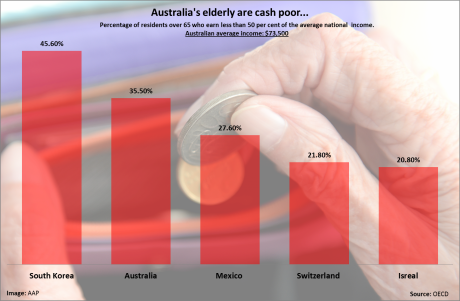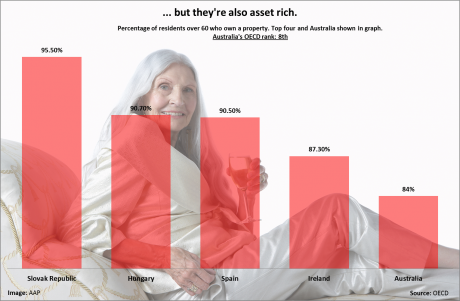Australia's pensioners are both the poorest and richest in the world
Australia’s senior citizens are an extraordinary bunch and that's not only because they have lived through some of the most tumultuous times in modern history.
They are also outliers in most global studies of government pensions simply because they are living a contradiction. They are both rich and poor at the same time. Let me explain.
Back in 2009, during its study into global government pensions, the OECD lambasted the Australian government for its low pension payments. At the time, it claimed that Australia paid less than 3 per cent of its total gross domestic product towards pensions, well below the OECD average of 7 per cent of GDP.
It had a point. Since that report, Australia’s over-60 poverty rate has actually increased from 26.9 per cent to 35.5 per cent. This is despite pensioners receiving extra benefits in years recently past, including the Gillard government’s clean energy supplement bonus.
(Click to enlarge)
But that’s not the whole story.
Australia’s pension may pull many elderly under the national poverty line. And living on the pension may see many of Australia’s elderly leading a cash-poor life.
But at the same time, the vast majority of Australia’s pensioners are home owners.
(Click to enlarge)
Given the median house price in Australia -- which according to the latest RP Rismark data is around $510,000 across Australia's five major capital cities -- they should have just enough to afford a modest retirement on top of the pension, if they sell their property.
Still, many pensioners would feel it’s pretty heartless to say that this is the way things should be in Australia. Imagine having to work your whole life to buy a property, and then having to sell it off to afford retirement. Most would likely prefer to bequest their property to their children. Some even donate it to charity.
But these statistics are likely what the government is considering when it says it is going to examine the means test that decides whether someone aged over 65 -- soon to be 70 -- is eligible for the pension.
It will be interesting to see how any of these impending changes impact the way our pension stacks up against other OECD nations. This infographic below reveals our current ranking in a number of criteria.
Despite all of this, it’s worth keeping in mind that it will take several years to make any alteration to the current aged pension scheme. This means any decision made today will likely hurt my generation (Gen Y) more than any of Australia’s existing seniors. Too bad so many young people really couldn’t really care less about this pension debate.
Got a question? Ask the reporter @HarrisonPolites on Twitter or leave a comment below. He will not reply to snail mail.


















